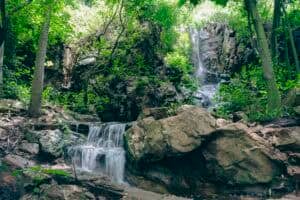In response to this crisis, a ‘Save Durban Harbour’ Facebook group has been set up to bring awareness of the pollution problem in Durban Harbour.

Eco-activists are up in arms regarding reports of crude oil and raw sewage flowing into the Bay and Durban Harbour over the festive period.
According to activist Delwyn Pillay from Greenpeace, the oil and sewage have resulted in massive fish kills in the area.
He said there has been no response from the relevant authority, including Transnet Port Authority.

Sewage is seen in the water.
Pillay said Section 19 of the National Water Act, 36 of 1998 (NWA) places an obligation on the owner or occupier of land to take reasonable measures to prevent pollution from occurring to a water resource.
“There has been public concern about the pollution from the major catchments, including the uMbilo River, going out into our oceans. A River Water Quality Map reading for November 2020 shows critical levels, which fly in the face of the announcement on 27 November of Blue Flag status for five of Durban’s main beaches, including uShaka Beach. During the ceremony the MEC for Economic Development, Tourism and Environmental Affairs, Ravi Pillay, mentioned that to gain the Blue Flag status, it requires sustainable adherence in a number of fields – highlighting that upstream water and rivers which feed into the ocean also has to be monitored with regard to waste and sanitation,” he said.
He said there were reports of crude oil still discharging into the Durban Harbour in December and at the end of the month there were reports of sewer contamination of the Bay and further into the harbour by Wilson Wharf where a large number of fish were killed.
Laura Washington from the Umbilo River Community group said as the community of the Umbilo River Valley, they have emphasised the ongoing ‘ecocide’ of the river due to the malfunctioning Boom Street Waste Water Treatment Plant which is 10 years overdue for an upgrade.
ALSO READ: Concerns raised over unrelenting pollution of the Vaal River
“It is simply unable to cope with the waste that it is currently receiving both in the form of residential sewerage as well as industrial effluent. E-coli tests conducted privately by residents as well as by the city frequently register levels in excess of what the municipality itself considers raw sewerage. The result of this is that oil from the Transnet spill, e-coli contamination, and hazardous waste from the plant as well as from industry have severely impacted the riverine ecosystem. We have to question the Blue Flag Status of our Durban beaches with these contaminants flowing freely into the harbour,” she said.
In response to this crisis, a ‘Save Durban Harbour’ Facebook group has been set up to bring awareness of the pollution problem in Durban Harbour.
The administrators of the page say nets or grids could be installed and boats could clean the harbour, especially the mouth, before all the rubbish is pushed into the oceans.
ALSO READ: New plan to combat Hennops pollution
Transnet responds to allegations
In response to a request for comment, Transnet Pipelines (TPL) Chief Executive, Michelle Phillips said TPL completed the clean-up of the crude oil contamination in the Durban Harbour and uMbilo River, following the oil spill caused by an attempted fuel theft incident last year.
“Although there is no visible free phase product in the river, two booms were strategically placed as a precautionary measure, one at the storm water outlet, which was a flow path from the spill site, and one at the harbour mouth. These booms will contain any residue that may be present in the storm water culvert. We are still working adjacent to the M7 (at the actual rupture point) and everything is contained onsite. There is no contamination going into the river or harbour from our pipelines site,” she said.
Transnet has appealed to all industries upstream to put measures in place to prevent further contamination of the river. She said a criminal case has been opened for this incident, however, there have been no arrests yet.
“We appeal to residents or any persons living near the pipelines or driving past, especially at night, to report any suspicious activities such as bakkies, fuel tankers in the area of the block valve chambers or near our pipeline markers,” she said. The TPL toll free number is 0800 203 843.
EThekwini Municipality referred Berea Mail to Transnet for comment, although an appeal for feedback regarding the issue of sewage was made.
This article was republished from Berea Mail with permission
For more news your way, download The Citizen’s app for iOS and Android.









